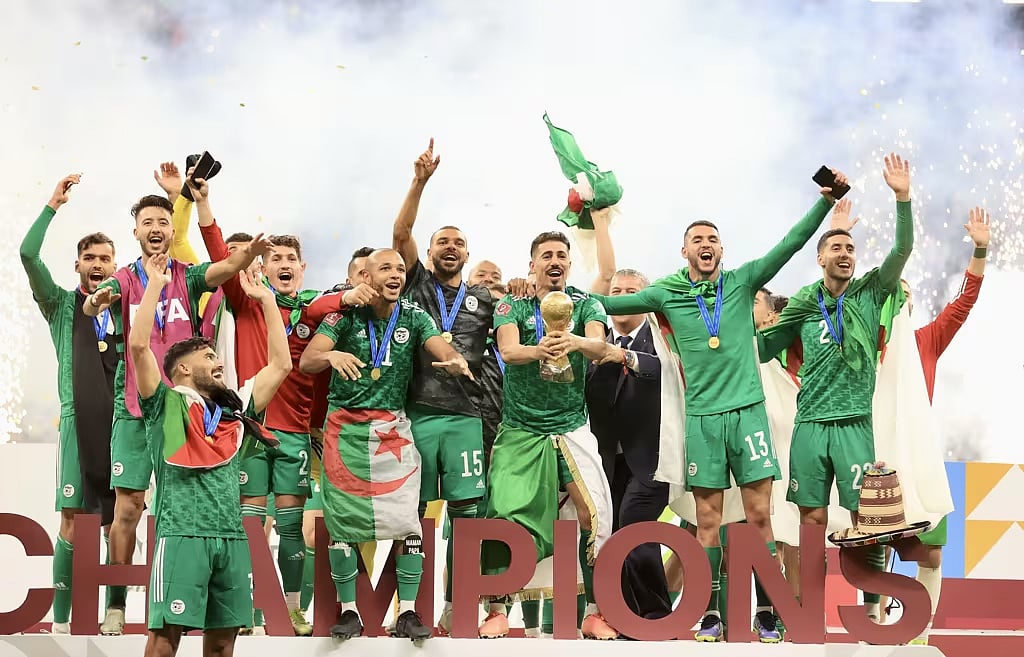Dubai: The Arab Cup is set to ignite Doha from December 1 to 18, bringing together 16 national teams in a tournament that blends fierce competition with deep cultural pride. Played across six world-class venues, the 2025 edition features seven nations already qualified for the Fifa World Cup 2026 — a testament to the rising level of Arab football.
Host nation Qatar, defending champions Algeria, and the seven highest-ranked sides at the time of the draw all booked their places automatically. They join seven qualifiers to complete the 16-team lineup, drawn into four balanced groups:
Group A: Qatar, Tunisia, Syria, Palestine
Group B: Morocco, Saudi Arabia, Oman, Comoros
Group C: Egypt, Jordan, UAE, Kuwait
Group D: Algeria, Iraq, Bahrain, Sudan
The curtain-raiser will take place at the iconic Al Bayt Stadium, with the grand finale set for Lusail Stadium on December 18. The top two teams from each group will advance to the knockout rounds.
Deep legacy
Since its launch in 1963, the Arab Cup has captivated football fans across the region. Far more than a sporting competition, it has long stood as a symbol of Arab unity and collective ambition. Yet despite its popularity, the tournament’s early decades were marked by irregular hosting cycles and frequent organisational challenges.
A major turning point arrived in 2021, when Qatar hosted a landmark tenth edition — the first ever to receive official Fifa recognition. Beyond celebrating Arab football, the tournament served as a crucial test event ahead of the Fifa World Cup Qatar 2022. Its resounding success encouraged Fifa to formally institutionalise the Arab Cup, confirming three future editions for 2025, 2029, and 2033, all set to take place in Qatar.
Spanning more than sixty years — from its inaugural tournament in 1963 to its eleventh edition — the Arab Cup has maintained a strong cultural and sporting presence. For fans across the Arab world, it holds deep national significance and provides a platform for regional talent to shine beyond the global football spotlight. Still, the first nine editions, held from Lebanon in 1963 to Saudi Arabia in 2012, suffered from inconsistent scheduling and interrupted continuity.
Global event
The 2021 tournament in Doha transformed the Arab Cup from a regional competition into a truly global event. With Fifa’s official endorsement, the tenth edition introduced major updates to the tournament’s format, regulations, and structure. For the first time, the scale of participation required a qualification stage: fourteen teams competed in preliminary qualifiers, with seven advancing to join the nine highest-ranked Arab teams based on the Fifa World Ranking.
Matches were staged across six venues that would later host Fifa World Cup Qatar 2022 fixtures, drawing exceptional crowds and delivering a remarkable standard of play. Algeria lifted the trophy after defeating Tunisia 2—0 in the final, while host nation Qatar secured third place by edging Egypt 5—4 on penalties following a goalless draw.
The 2021 edition also marked the first use of Video Assistant Referee (VAR) technology in the Arab Cup and set new benchmarks for attendance. With stadiums boasting a minimum capacity of 40,000 seats, overall occupancy averaged nearly 80 per cent. The Qatar — UAE quarter-final at Al Bayt Stadium attracted a record-breaking 63,439 spectators — the highest single-match attendance in the tournament’s history.
Across the history of the Arab Cup, Iraq remains the competition’s most decorated nation with four titles (1964, 1966, 1985, 1988). Saudi Arabia follows with two championships (1998, 2002). Four additional nations have each won the tournament once: Tunisia (1963), Egypt (1992), Morocco (2012), and Algeria (2021).
Jordan stands as the Arab Cup’s most consistent participant, competing in nine of the ten editions held so far and playing 38 matches. Kuwait and Lebanon follow with appearances in eight editions and 30 matches each. Saudi Arabia and Syria have both featured in seven editions.
Where to watch
All 32 matches will be broadcast live and free-to-air across 24 Mena markets on beIN Sports
Network Links
GN StoreDownload our app
© Al Nisr Publishing LLC 2026. All rights reserved.
